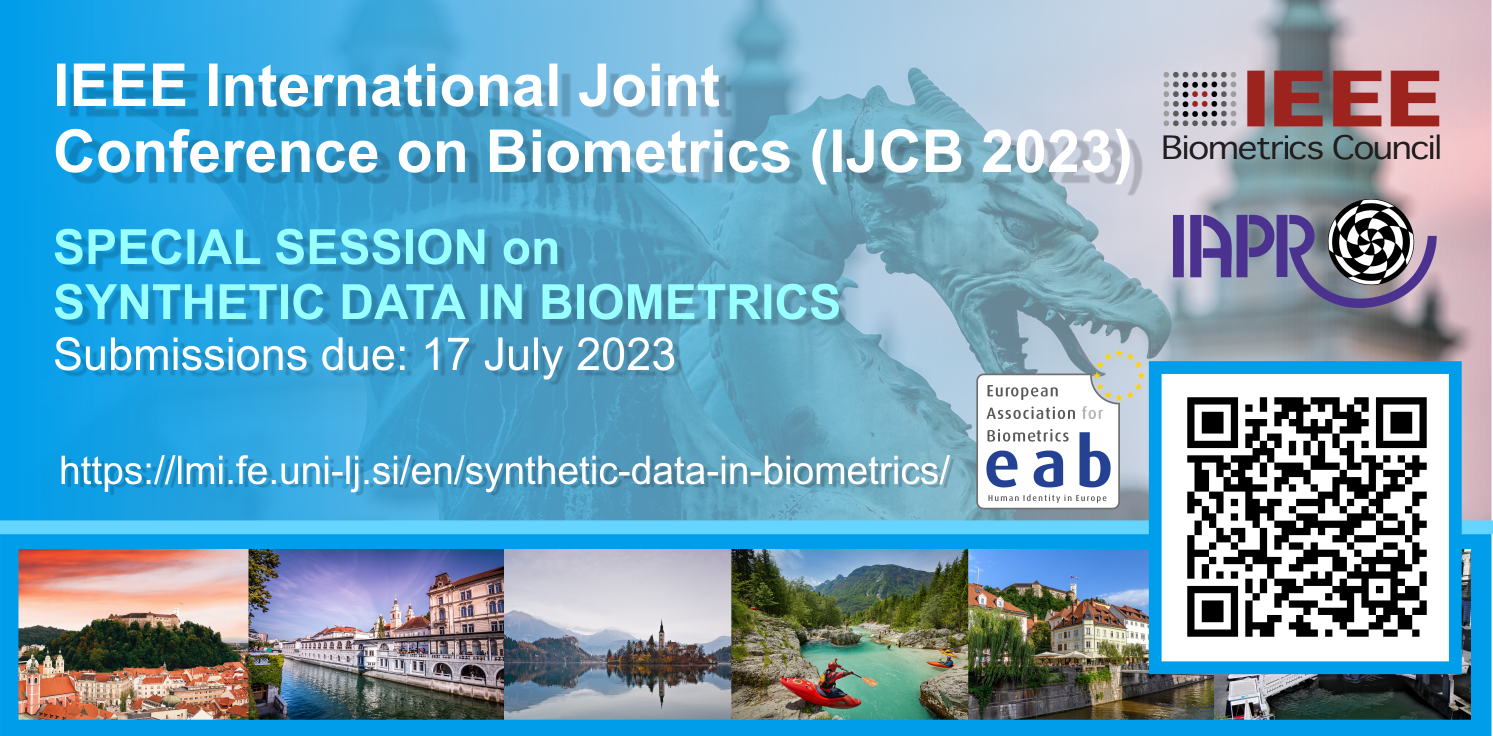
IEEE IJCB 2023 Special session
Submission deadline: 31 July 2023
We are organizing a special session on Synthetic data in biometrics as part of the IEEE International Join Conference on Biometrics (IJCB) 2023 that will be held 25-28 September 2023 in Ljubljana, Slovenija. IJCB is the premier international forum for research in biometrics and related technologies. It combines two major biometrics conferences, the IEEE Biometrics Theory, Applications, and Systems (BTAS) conference and the International Conference on Biometrics (ICB), and is made possible through a special agreement between the IEEE Biometrics Council and the IAPR TC-4. Details on the conference can be found here: https://ijcb2023.ieee-biometrics.org/
Detail on the special session are given below.
Motivation
In recent years, the field of biometrics has witnessed remarkable progress across different modalities, including facial images, fingerprints, iris scans, and behavioral biometrics. However, the development of accurate and robust biometric systems heavily relies on large-scale, diverse, and annotated datasets. Gathering such datasets, especially when dealing with sensitive personal information, can be challenging due to privacy concerns, legal constraints, and limited access to large-scale real-world data.
The IJCB 2023 special session on »Synthetic data in Biometrics« will explore the emerging field of synthetic data for biometrics and its potential to revolutionize the development, evaluation, and deployment of biometric systems. Synthetic data, generated through advanced machine learning models, offers a promising solution to address the limitations of real-world data collection. By synthesizing artificial biometric samples, researchers can create large-scale (annotated) datasets that exhibit diverse variations and can be used for training and testing of biometric models, all while respecting privacy constraints.
By bringing together researchers, practitioners, and industry experts, this special session will foster discussions on the potential of synthetic data for biometrics. The special session will solicit contributions exploring novel methodologies, applications, and challenges associated with synthetic data generation, evaluation, and utilization in biometric research. Topics of interest include, but are not limited to:
- Novel generative models for biometric data synthesis
- Label generation for synthetic data
- Data factories for training biometric (detection, landmarking, recognition) models
- Synthetic data for data augmentation
- Data synthesis for bias mitigation and fairness
- Quality assessment for synthetic data
- Synthetic data for privacy protection
- Novel applications of synthetic data
- New synthetic datasets and performance benchmarks
Significance and novelty
Synthetic data generation currently represent a hot topic not only in biometrics, but also in the broader area of artificial intelligence. Given the need of state-of-the-art deep learning models for massive datasets, it is getting increasingly difficult to ensure proper consent for the collected datasets and have proper control over the distribution and characteristics of the collected data. Synthetic data has the potential to automate the data collection process, provide labels and annotations with minimal human intervention, and provide means for minimizing ethics and privacy concerns. These issues are currently of significant importance for biometrics in general and require a forum for discussion that is distinct form the regular IJCB 2023 sessions. We, hence, believe it could help to enrich the conference and attract a significant number of high-quality submissions.
Paper formatting and submission
Paper submitted to the special session should follow the formatting guidelines, instructions and templates provided for the main conference submissions, posted here: https://ijcb2023.ieee-biometrics.org/paper-submission/
In general, a paper can be up to 8 pages including figures and tables, plus an unlimited number of additional pages for references only. The reviewing process will be double blind.
All accepted papers will be included in the main part of the IEEE IJCB 2023 proceedings and will be submitted for inclusion in IEEE Xplore.
Papers should be submitted to the Special session track of the IJCB 2023 CMT instance. Select “Special Session: Synthetic data in Biometrics” as the primary subject area during the submission:
https://cmt3.research.microsoft.com/IJCB2023
Important Dates
- Paper submission deadline: 31 July 2023
- Notifications to authors: 14 August 2023
Organizers
- Fadi Boutros, Fraunhofer IGD, Germany
- Nasir Memon, NYU, USA
- Vitomir Štruc, University of Ljubljana, Slovenia
- Andreas Uhl, Salzburg University, Austria
Some relevant references
Boutros, F., Struc, V., Fierrez, J., & Damer, N. (2023). Synthetic data for face recognition: Current state and future prospects. Image and Vision Computing, 104688. [PDF]
Makrushin, A., Uhl, A., & Dittmann, J. (2023). A Survey on Synthetic Biometrics: Fingerprint, Face, Iris and Vascular Patterns. IEEE Access, 11, 33887-33899. [PDF]